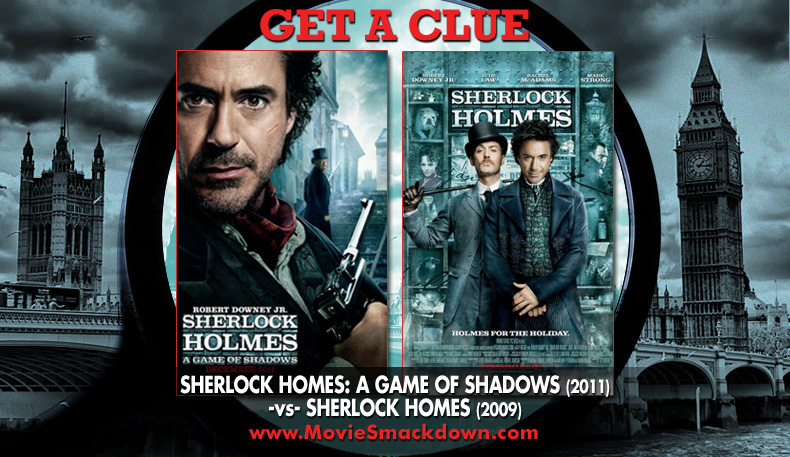
The Smackdown
By my count, Sherlock Holmes appeared in no less than 69 films before this latest Robert Downey Jr. – Guy Ritchie incarnation. Even movie mainstays Godzilla (52 films) and James Bond (25 films) don’t come close to the sheer proliferation of Sir Arthur Conan Doyle’s famous super-sleuth throughout cinema history.
After the first film in the Ritchie/Downey relaunch (the appropriately titled Sherlock Holmes) grossed more than $524 million worldwide, it didn’t take a supersleuth to figure that even further expansion of the venerable franchise was inevitable, and with this weekend’s release of Sherlock Holmes: A Game of Shadows, we have our sequel. As no other human being, actual or fictional, could be remotely capable of outsmarting the great Holmes, the only sporting thing to do is prop up a mirror and face the old boy off against himself. Something tells me he’d like the challenge.
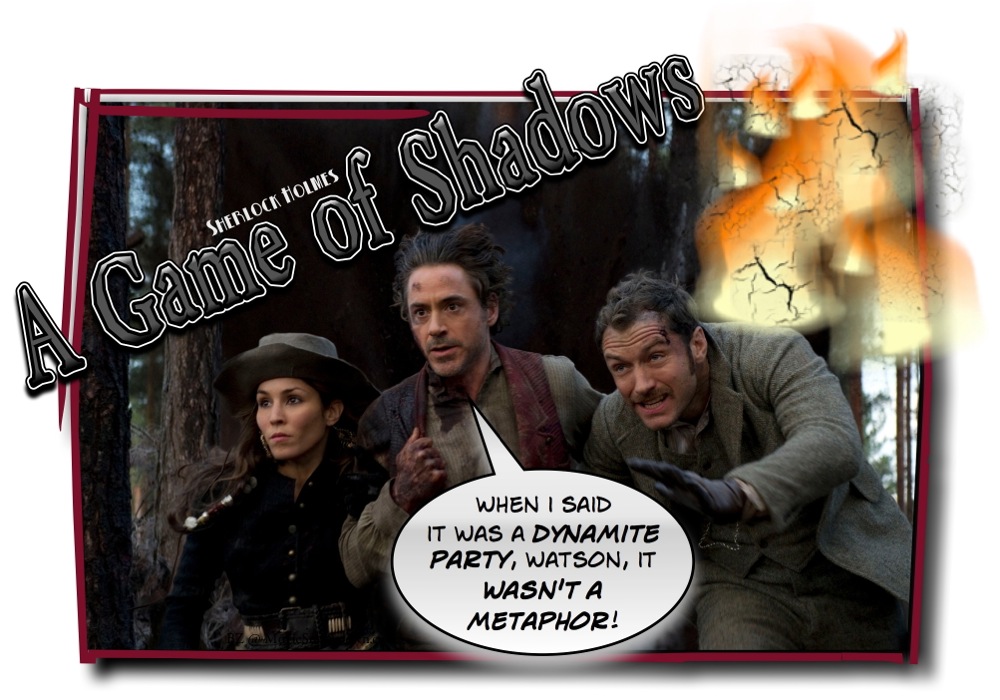
The Challenger
Sherlock Holmes: A Game of Shadows sees an increasingly isolated Sherlock Holmes (Robert Downey Jr.) forced to deal with the imminent loss of Dr. Watson (Jude Law) to matrimony’s eternal bliss. Immediately after preventing a bombing, Holmes finds himself about to go toe-to-toe with the elusive Professor James Moriarty (Jared Harris), a man so deviously brilliant as to rival Holmes himself.
Holmes’ proclivity for making social outings into working lunches leads him to Madam Simza (Sim) Heron (Noomi Rapace), a fortune-teller with a strange, indirect connection to the professor that may provide the key to stopping him. Ultimately, Holmes and Moriarty engage in a figurative (and eventually literal) chess match all over Western Europe, as Holmes tries to prevent Moriarty from disrupting the region’s already fragile peace.
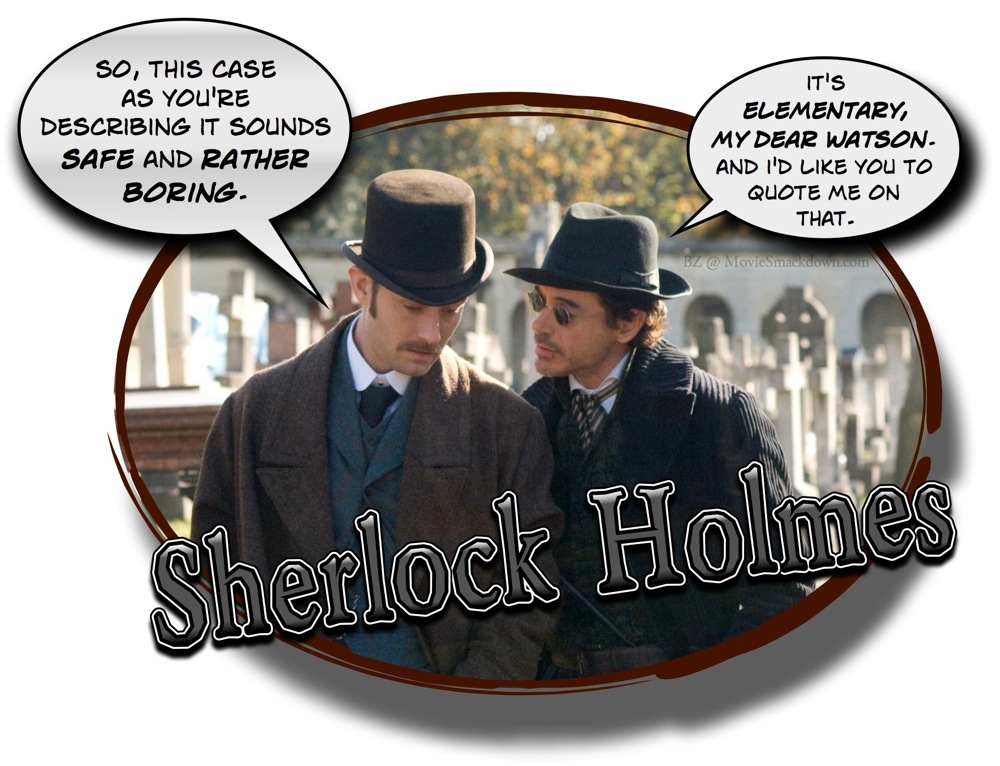 The Defending Champion
The Defending Champion
2009’s Sherlock Holmes finds Holmes and Watson at what seems to be the end of their famous partnership to solve that most obscure of cinematic quandaries, the one last case. They apprehend Lord Blackwood for the practice of black magic and subsequent murder of five women, but Holmes must keep the disgraced nobleman from embarking on another killing spree—after he’s been executed, confirmed dead and laid to rest.
Following Blackwood’s apparent resurrection, the duo must act quickly to keep London from going into widespread panic. Complicating matters is the unexpected presence of Irene Adler (Rachel McAdams), a former flame and criminal counterpart of Holmes. In the end, Holmes and Watson embark on a race against time to discover the secret of Blackwood’s power before he can take the first step toward carrying out his plan.
The Scorecard
When talking about reboots, the discussion can be a bit of a mixed bag. For every soaring Batman Begins, there’s a Planet of the Apes (2001) that lands with a thud. The reimagining of literature’s most famous detective is not without peril. Personally, when I think of Sherlock Holmes, I picture a tall slender man with a widow’s peak and hooked nose who remains unflappable in the face of any situation – much like Basil Rathbone, who played the character fourteen times in the World War II era. These traits are not things that come to mind when Robert Downey Jr. hits the screen, but that’s not necessarily a bad thing. As written, Downey’s performance comes from the same mold Alan Moore had in mind when conceiving his landmark graphic novel Watchmen, where superheroes exist alongside everyday Joes and Janes. Moore surmised that heroes at that level of intensity would require a hint of psychosis or at least a severe compulsive condition that would make them borderline insane. That’s Downey’s Holmes in a proverbial nutshell. His voice races to try to keep pace with the speed of his thoughts, his eyes roam the room impulsively, and we get the feeling he is almost never surprised by anything.
In Sherlock Holmes, these traits, while posing a challenge to conventional notions of who the character is “supposed†to be, aren’t at all detrimental. He elicits our sympathy when he backs himself into social corner after social corner. Additionally, writers Michael Robert Johnson, Anthony Peckham and Simon Kinberg, working from a story by Lionel Wigram and Johnson, employ a bullet-time like device to outline Holmes’ problem-solving capability. Instead of merely showing him laying intellectual waste to his opponents with lightning speed, the action shifts to slow-motion while he painstakingly prepares his every move and outlines his plan of attack. (Director Ritchie used a similar time-shifting technique in such films as Lock, Stock and Two Smoking Barrels.) Then, when the action shifts back into real-time, the speed with which Holmes acts is a remarkable thing, because the audience knows exactly what went into planning each movement.
By contrast, in Game of Shadows, Holmes’ behavior comes across as more of a caricature, and there’s a much greater reliance on convenience by screenwriters Kieran and Michele Mulroney. Wait, Holmes and Watson are in serious trouble and could really use the help of Noomi Rapace (sans Dragon Tattoo)? There she is—with a squad of gypsies to provide handy covering fire! Trapped in a basement? Here’s a secret tunnel! Furthermore, when the action shifts into problem-solving, plan-making, bullet-time, Holmes’ strategies aren’t always fully realized. The first time this happens it’s kind of funny, because he gets some unexpected help from another character. Unfortunately, when the same deception happens again and again, it begins to feel like a cheat.
Both films feature intriguing supporting characters, but once again, there’s a sizable advantage to the 2009 film in how those relationships are explored. In Sherlock Holmes: A Game of Shadows, a key supporting character is killed off very early, removing one of the first film’s most exciting interpersonal dynamics. (I hope this isn’t a new trend in film sequels. It also happened too quickly to Franka Potente’s Marie character in The Bourne Supremacy, a decision that still ticks me off.) Come on! If you’re going to kill someone for shock effect, why not just go for the jugular and make it Watson? At least we can be thankful the filmmakers didn’t overcompensate for this ill-advised waste of a good character by substituting someone else into the narrative, which would have seemed forced and inauthentic.
Additionally, while both villains are compelling, 2009’s Lord Blackwood (Mark Strong) is a stronger character and more effective than 2011’s Moriarty, something that surprised me greatly. In comparison to Moriarty’s not-so-grand plot (which I shall not reveal here except to say that it involves a bit more financial savvy than I like in my Nineteenth Century British criminal masterminds), Blackwood’s plan to take over the world has a bravado that really hits home. Despite a certain initially off-putting fantastical element to his character, Blackwood manages to keep pace with Holmes almost from the get-go, and what’s more, seems to have the goods to back up his claim to magical control of the natural world.
By contrast, Moriarty never quite hits the same menacing note. Jared Harris, who plays Moriarty, answered questions at the screening I attended and talked about how he loved and was inspired by villains who keep their motivations hidden from the audience, such as the early Hannibal Lecter. Ironically, despite Harris’ excellent performance, that’s the key thing the filmmakers were unable to accomplish with his character.
The Decision
Sadly, despite a promising concept and the return of many of the first film’s key characters and motifs, Sherlock Holmes: A Game of Shadows just isn’t as cohesive, consistent or as much sheer fun as our winner, Sherlock Holmes.
Elementary, my dear reader? I should think so.




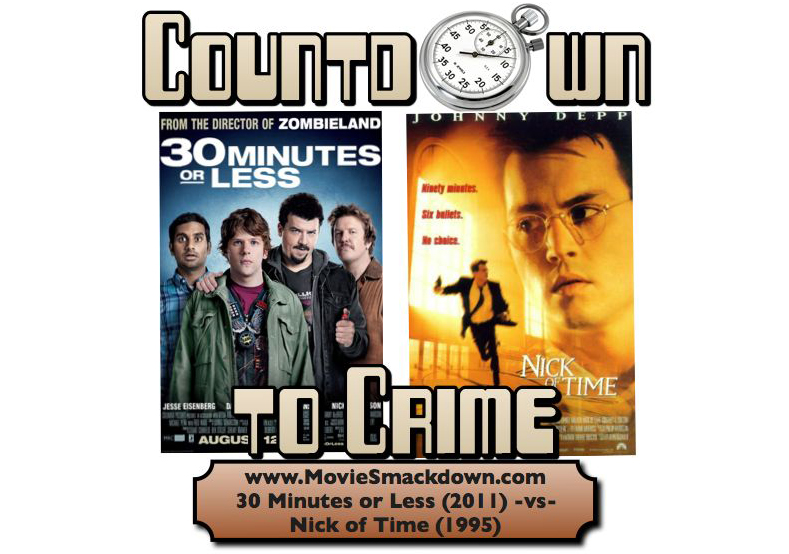
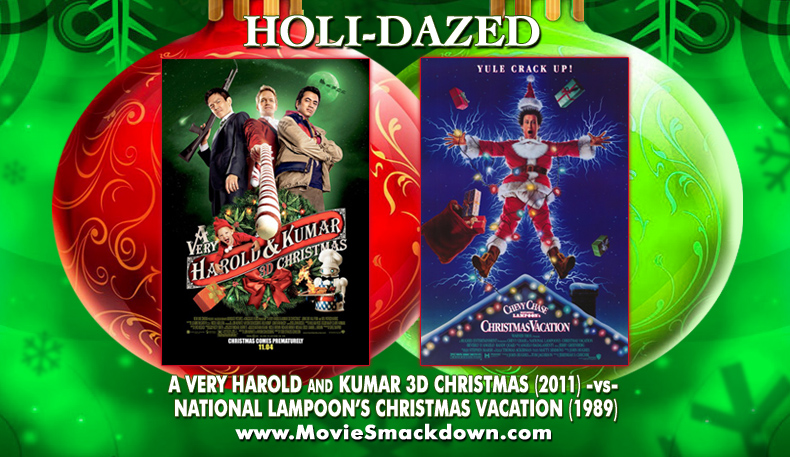
They really dropped the ball with Dr. Moriarty, which was very disappointing. Not only was he the perfect villain to match Holmes, but I also admire Jared Harris as a brilliant character actor and this definitely was not his best role. Still can’t help liking the film though.
I really thought the first SH flick was great, it’s just a pity they went and ruined the franchise with a less-than-stellar effort this time out. I’m still going to see Game Of Shadows (because any film with RDJ in it is too good to pass up) but I’m not holding my breath!
I agree about the charm factor that the first flick has. Even when it reaches a little too far, Downey and Law are extremely effective at anchoring the picture emotionally and bringing it back down to earth. Unfortunately, with the second, I think that the idea was to expand the Holmes universe with all of the bouncing around from country to country and whatnot. Sadly, what I don’t think the filmmakers realized is that a bigger board doesn’t necessarily make for a better game.
Jackie and I were seated at the DGA screening for the first “Sherlock Holmes†where Guy Ritchie spoke after. We ended up sitting in the same row with Robert Downing Jr. and his wife. I think back then Downey wasn’t sure if it would work — he was chewing gum like crazy — but the audience loved it.
I loved the first half of the original and then, as the plot escalated into bigger and less credible things, I thought it lost a little of its charm.
But Downey is so damn charming, in person and on screen, so there’s always that.
I had hoped that the filmmakers would balance the tone a bit for the second installment.
Please join the Facebook conversation room (The Smack) at http://www.facebook.com/moviesmackdown